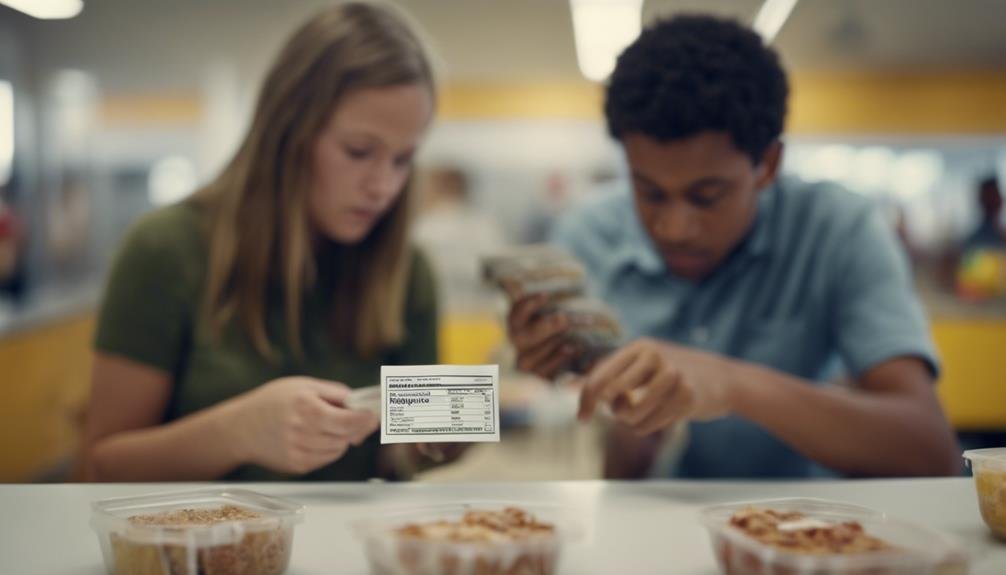"Cherishing Little Steps - A Haven for Baby and Family Journeys"
Navigating Food Allergies in School: A Guide for Parents
You may think managing food allergies in school is as easy as juggling flaming torches while riding a unicycle. However, fear not, as this guide will shed light on how parents can guarantee their child's safety and well-being in a school environment.
From understanding food allergies to building a support system, each aspect plays a vital role in keeping your child safe.
So, are you ready to take the first step towards creating a secure school experience for your little one?
Key Takeaways
- Understand food allergies to identify triggers and reactions effectively.
- Communicate with school staff to ensure your child's safety.
- Read labels meticulously for hidden allergens and understand dietary restrictions.
- Create a safe school lunch plan by preparing allergen-free lunches and following school policies.
Understanding Food Allergies in Children

If your child has a food allergy, understanding the specific triggers and potential reactions is important for their safety at school. Allergy testing can pinpoint exactly what foods your child needs to avoid. These tests are critical in determining the severity of the allergy and establishing a plan of action. Once you know the allergens, dietary restrictions play a key role. Reading food labels diligently, educating yourself about hidden allergens, and communicating effectively with school staff are vital.
Managing your child's food allergy requires vigilance and preparation. Make sure to inform teachers, the school nurse, and cafeteria staff about your child's allergies. Provide them with an action plan, emergency contacts, and necessary medication. Additionally, have a meeting to discuss strategies for preventing accidental exposure. By taking these proactive steps, you can help create a safe environment for your child at school. Remember, knowledge is power when it comes to food allergies.
Common Food Allergens to Watch For
Identifying common food allergens is essential for safeguarding your child's health at school. Here are three key points to keep in mind when maneuvering food allergies:
- Food Allergy Testing: If your child hasn't been tested for food allergies, consider consulting an allergist. Knowing your child's specific allergens can help you better advocate for their safety at school.
- Cross Contamination: Be vigilant about the risk of cross contamination, especially in shared spaces like cafeterias. Educate school staff about the importance of preventing cross-contact to avoid allergic reactions.
- Hidden Ingredients: Always read food labels carefully. Some allergens may be present in unexpected places. Look out for common allergens like peanuts, tree nuts, milk, eggs, soy, wheat, fish, and shellfish hidden in food products.
Reading and Decoding Food Labels

When maneuvering food allergies in school, understanding how to read and decode food labels becomes an essential skill in ensuring your child's safety and well-being. Interpreting ingredients is key to identifying hidden allergens that may not be obvious at first glance. Start by scanning the ingredient list for common allergens like peanuts, tree nuts, dairy, soy, wheat, eggs, and fish. Look for any derivatives or alternate names for these allergens, as they can sometimes be listed in less recognizable terms.
Pay close attention to allergen warnings such as 'may contain' or 'processed in a facility that also handles,' which indicate potential cross-contamination risks. Familiarize yourself with label reading basics, such as the order of ingredients by quantity and understanding date labeling like 'best by' or 'use by' dates. By honing your ability to interpret food labels, you empower yourself to make informed decisions that safeguard your child against allergen exposure.
Creating a Safe School Lunch Plan
Managing food allergies in school requires creating a school lunch plan that prioritizes your child's safety and well-being. It can feel overwhelming, but with careful meal prep and understanding school policies, you can make sure your child stays safe while enjoying their lunchtime.
Here are three key steps to help you create a safe school lunch plan:
- Meal Prep: Take the time to plan and prepare your child's lunches at home. By packing allergen-free meals, you can have peace of mind knowing exactly what ingredients are in their food.
- Communicate with School Staff: Make sure to inform the school about your child's food allergies. Discuss their specific dietary needs and any accommodations that may be necessary to keep them safe.
- Review School Policies: Familiarize yourself with the school's allergy policies. Understand how they handle food allergies, where medications are stored, and the procedures in place in case of an allergic reaction.
Effective Communication With School Staff

To foster a collaborative and safe environment for your child at school, ensuring effective communication with the school staff is paramount. Parent-teacher collaboration is key in managing food allergies. Initiate a meeting with your child's teacher and the school nurse to discuss your child's allergies, triggers, and specific needs. Guarantee the school is aware of your child's allergy action plan, including any medications that need to be kept on-site. Familiarize yourself with the school policies regarding food allergies, including protocols for snacks, classroom celebrations, and lunchtime procedures.
Provide the school with updated emergency contacts and guarantee they're easily accessible. Encourage open dialogue with teachers and staff about your child's allergies, symptoms of a reaction, and how to respond in case of an emergency. Clear communication can help prevent misunderstandings and ensure a swift response if an allergic reaction occurs. By working together with the school staff, you can create a safer environment for your child to thrive at school.
Managing Food Allergy Emergencies
In case of a food allergy emergency, swift action is essential to guarantee your child's safety and well-being. It's important to be well-prepared for any unexpected situations that may arise. Here are some key points to take into account:
- Emergency Response: Make sure that you and your child's school have a clear plan in place for handling allergy emergencies. Communicate this plan with teachers, school nurses, and administrators so everyone is aware of what steps to take if an emergency occurs.
- Medical Training: Ensure that key staff members at the school are trained in administering epinephrine and are familiar with your child's specific allergies. Regularly review and update medical forms and emergency contact information to guarantee accuracy.
- Emergency Kit: Provide the school with an emergency kit containing your child's prescribed medications, such as epinephrine auto-injectors, antihistamines, and a personalized emergency action plan. This kit should be easily accessible and kept in a designated secure location that's known to all staff members.
Building a Support System for Parents

During challenging times, having a strong support system can make a significant difference in handling the complexities of managing your child's food allergies at school. As a parent maneuvering this journey, it's essential to connect with others who understand your concerns and can offer valuable insights. Consider joining parent meetups or online forums where you can share experiences, learn about new strategies, and receive emotional support.
| Support System Options | Description |
|---|---|
| Parent meetups | Attend local gatherings where parents of children with food allergies come together to discuss challenges, share tips, and offer encouragement. |
| Online forums | Join virtual communities where you can ask questions, seek advice, and connect with parents facing similar situations. Online forums provide a convenient way to access a wealth of information and support from the comfort of your home. |
Frequently Asked Questions
How Can Parents Navigate Food Allergies in School When Their Child Has Multiple Food Allergies?
When your child has multiple food allergies, meal planning becomes important. Pack allergy-friendly snacks for school lunches. Communicate with teachers and school staff about your child's allergies to guarantee a safe environment.
What Steps Can Parents Take to Ensure Their Child's Food Allergies Are Taken Seriously by School Staff?
To guarantee school staff take your child's food allergies seriously, advocate for them by requesting accommodations. Use effective communication strategies to convey the severity. Encourage staff training on allergy management to create a safe environment.
Are There Any Legal Protections in Place for Children With Food Allergies in Schools?
You can rest assured that legal protections exist for children with food allergies in schools. Schools are required to provide accommodations, adhere to policies, and enforce safety measures to guarantee your child's well-being.
How Can Parents Teach Their Child to Advocate for Themselves When It Comes to Their Food Allergies at School?
You can empower your child by teaching self-advocacy skills. Start by discussing the importance of speaking up about their food allergies. Role-play scenarios to help them feel confident. Review school policies and educational materials together for better understanding.
What Are Some Resources Available for Parents to Help Educate Their Child's Classmates About Food Allergies?
To raise allergy awareness among classmates, parents can provide educational resources like videos, books, or presentations. Get involved by working with teachers to implement classroom accommodations. By fostering understanding, you create a safer environment for all.
Conclusion
Remember, maneuvering food allergies in school is no small feat, but you've got this! By staying informed, communicating effectively, and being prepared for emergencies, you're already a superhero parent.
So go forth with confidence, armed with knowledge and ready to tackle any food allergy challenges that come your way. You've got the power to keep your child safe and thriving in the school environment.
You're a food allergy warrior, and nothing can stand in your way!


